 You’ve written this great book, but you can’t seem to capture the interest of an agent or publisher. You’ve sent it to every agent and every publisher in the listings, but all you get back is rejections and sometimes not even that. How long does this go on for before you ask yourself “Is it me?” On the other hand, you may feel that your work isn’t good enough for publication, so you may not have submitted it to an agent or publisher because you think it will be rejected. Why might you feel that way? Let me introduce you to the Dunning-Kruger effect. 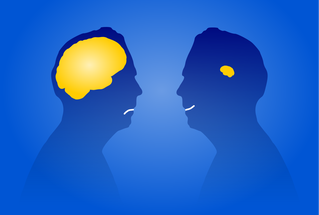 Stupid people don't know they are stupid! Stupid people don't know they are stupid! This is a hypothesis in social psychology postulating that people of lower capability don’t know their capabilities are low, while people of higher capability don’t always realise how capable they are. This has sometimes been unfairly paraphrased as “stupid people don’t know they are stupid” and, of course, the opposite of that is that clever people sometimes don’t realise how clever they are. I have to say up front that there are critics of the hypothesis. Firstly, in some cultures there is great emphasis placed on modesty, so a clever person would never claim to be cleverer than someone else, because that would be immodest. Similarly, in some cultures it is considered rude to criticize others, so honest feedback on poor performance isn’t always provided. The other flaw is that the studies that were carried out to test the hypothesis used psychology students as the subjects and they aren’t representative of society as a whole. But leaving aside those criticisms, there is consistently strong evidence that the Dunning -Kruger effect is real . But what do we know about it? 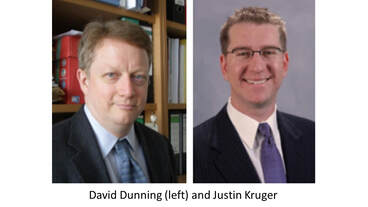 David Dunning and Justin Kruger are the two American psychologists that came up with the hypothesis (published in 1999) after noting that some of their poorer performing students didn’t seem to realise how poor their performances were. They also didn’t improve after being given feedback on their performance. So Dunning and Kruger went looking for an underlying cause for this misperception of capability. To test the hypothesis, subjects were asked to complete some self-assessment tests on a range of subjects. After being given their results, the students were asked to rank themselves against their peers. Those that performed the worst tended to rate themselves higher than some of their peers, while those that had performed the best tended to rate themselves lower than some of their peers. 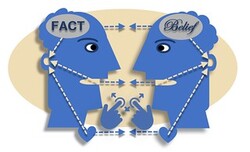 Subjects were interviewed after completing the exercise and asked why they had rated themselves as they had. The more capable students, who found the tests easiest, tended to think that their peers would also find the tests easy, so they had ranked themselves lower. Conversely, the poorer performing students, who had found the tests difficult, assumed their peers would also find the tests difficult and ranked themselves higher. This betrayed an internal bias. Poor performing students overrated their own performance, while better performing students overrated the performances of their peers. Even after providing feedback, these internal biases appeared to persist. 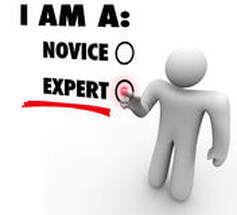 At this point I should inject a word of caution. The poorest performing students didn’t rank themselves in the highest performing bracket. So, a D grade student didn’t think they were performing as well as an A grade student. But they did assume they were performing as well or better than a C grade student. So, what has this to do with finding an agent or a publisher? Well, if we extend the Dunning-Kruger hypothesis into the world of publishing, an author who isn’t a great writer may, thanks to this internal bias, think that their work is better than it is. This will make it hard for them to understand why they are getting rejection after rejection.  On the other hand, a good writer may feel that their work isn’t as good as that of other good writers and that may discourage them from submitting their work to an agent or publisher in the first place, because they assume it will be rejected. If that is the case, is there a solution for the writer? There may be. The first thing to do is to understand that a cognitive bias actually exists and recognise the effect it might be having on our own perception of ourselves. We need to actually ask if we are as good (or as poor) as we think we are. And the only way to answer that question is to seek out unbiased feedback. 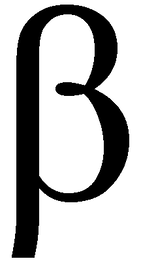 Many of you will already have worked out that I’m talking about beta readers. Friends and family aren’t good beta readers, because they don’t want to hurt the author’s feelings. They would tell William McGonagall* that his poetry is great if he was a friend or relative. This means that if an author wants honest feedback on their work, the beta reader must be a stranger, so that they can provide feedback that is free of any bias caused by emotional involvement. But there is a trap here that many authors – and beta readers – aren’t aware of. While a beta reader may start off being an unbiased stranger, that relationship changes over time. Authors want the best feedback, so they will nurture a valued beta reader and use them again and again. But the beta reader is bound to have an emotional response to that nurturing and that may affect the nature of their feedback. In other words, they may develop an emotional bond with the author which could classify them as a friend, thereby losing the independent viewpoint that made them so valuable in the first place. You might think of it as the Catch-22 of beta reading. If you are starting to think of a beta reader as a friend, then they have lost their value, but not treating them as a friend risks losing them. Ideally an author will find new beta readers for each new work. But that means a lot of work identifying and cultivating them, only to have to do it all over again for the next book and the next.  Florence Foster Jenkins Florence Foster Jenkins But being aware that the trap exist in the first place is a good first step. Be aware that the beta reader may want you to like them almost as much as you want them to like your work. As soon as you have exchanged email addresses, an emotional bond is starting to form, so it is necessary for both authors and beta readers to try to maintain an “arm’s length” relationship. However, having independent feedback is no use if you don't respond to it. Your beta readers have given you feedback - use it to improve your work. If you ignore it because it isn't what you want to hear, you have fallen into another trap and the Dunning-Kruger effect even predicts that trap because it identified that subjects often didn't respond to feedback on their performance. Who knows, you may improve your work enough to find an agent or a publisher. * William McGonagall (1825-1902) was a Scottish poet whose poems were so bad that he became famous. People paid to see him read his poems for the comedy value (his work was quite serious in its subject matter). McGonagall, however, was deluded enough to interpret that as evidence of his genius. See also Florence Foster Jenkins. If you have enjoyed this blog or found it informative, why not make sure you don't miss future editions by signing up for our newsletter. Just click the button below. We promise not to spam you and you can unsubscribe at any time.
0 Comments
Leave a Reply. |
AuthorThis blog is compiled and curated by the Selfishgenie publishing team. Archives
June 2025
|
 RSS Feed
RSS Feed